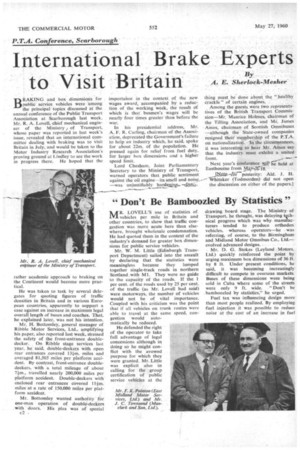International Brake Experts to Visit Britain
Page 52

If you've noticed an error in this article please click here to report it so we can fix it.
By....
A. E. SherlOck-Mesher
BRAKING and box dimensions for public service vehicles were among the principal topics discussed at the annual conference of the Public Transport Association at Scarborough last week. Mr. R. A. Lovell, chief mechanical engineer of the Ministry / of Transport, whose paper was reported in last week's issue, revealed that an internatiOnal committee dealing with braking was to visit Britain in July, and would be taken to the Motor Industry Research Association's proving ground at Lindley to see the work in progress there. He hoped that the
rather academic approach to braking on the Continent would become more practical.
He was taken to task by several delegates for quoting figures of traffic densities in Britain and in various European countries, apparently to support a case against an increase hi maximum legal overall length of buses and coaches. That, he explained later, was not his intention.
Mr. H. Bottomley, general manager of Ribble Motor Services, Ltd., amplifying his paper, also reported last week, stressed the safety of the front-entrance doubledecker. On Ribble stage services last year, he said, double-deckers with open rear entrances covered 134m. miles and averaged 81,505 miles per platform accident. By contrast, front-entrance doubledeckers, with a total mileage of about 74m., travelled nearly 200,000 miles per platform accident. Double-deckers with' enclosed rear entrances covered 113m. miles' at a rate of 150,000 miles Per platform accident.
Mr. Bottomley wanted authority for one-man operation of double-deckers with doors. His plea was of special e2
importance in the context of thc new wages award, accompanied by a reduction of the working week, the result of which is that' busmen's wages will be nearly four times greater than before the war.
In his presidential address, Mr. A. F. R. Carling, chairman of the Association, deprecated the Government's failure to help an industry which, he said, spoke for about 22m. of the population. He pressed again for relief from fuel duty, for larger box dimensions and a higher speed limit.
Lord Chesham, Joint Parliamentary Secretary to the Ministry of Transport, warned operators that public sentiment against the oil engine—its smell and noisp,
—was unjustifiably hardeniv
...:...-
thing must be done about the .".healthy crackle" of certain engines.
• Among the guests were two representatives of the British Transport Commission—Mr. Maurice Holmes, chairman of the Tilling Association, and Mr. James Amos, chairman. of Scottish Omnibuses —although the State-owned companies resigned their' membership of the P.T.A. on nationalization. In the circumstances, it was interesting to hear Mr. Amos say that the industry, must exhibit a united front.
Next year's conference be held at Eastbourne from Mia?..prig.
....f.N„p„tpi.foir-posterity: Ald. J. H. Whitaker (Todmorden) did not open the discussion on either of the papers.]
















































































































